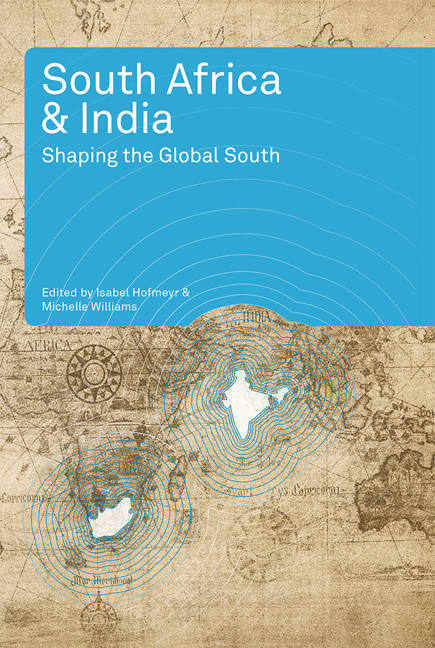Book contents
- Frontmatter
- Contents
- Acknowledgements
- Abbreviations and Acronyms
- Introduction
- Historical Connections
- Socio-political Comparisons
- Chapter 6 Renaissances, African and Modern: Gandhi as a Resource?
- Chapter 7 Democratic Deepening in India and South Africa
- Chapter 8 Local Democracy in Indian and South African Cities: A Comparative Literature Review
- Chapter 9 Reimagining Socialist Futures in South Africa and Kerala, India
- Chapter 10 Labour, Migrancy and Urbanisation in South Africa and India, 1900–60
- Conclusion
- Notes and References
- About the Authors
- Index
Chapter 9 - Reimagining Socialist Futures in South Africa and Kerala, India
from Socio-political Comparisons
Published online by Cambridge University Press: 21 April 2018
- Frontmatter
- Contents
- Acknowledgements
- Abbreviations and Acronyms
- Introduction
- Historical Connections
- Socio-political Comparisons
- Chapter 6 Renaissances, African and Modern: Gandhi as a Resource?
- Chapter 7 Democratic Deepening in India and South Africa
- Chapter 8 Local Democracy in Indian and South African Cities: A Comparative Literature Review
- Chapter 9 Reimagining Socialist Futures in South Africa and Kerala, India
- Chapter 10 Labour, Migrancy and Urbanisation in South Africa and India, 1900–60
- Conclusion
- Notes and References
- About the Authors
- Index
Summary
Introduction
The collapse of the Soviet Union and the ascendance of neoliberal globalisation catalysed progressive forces around the world to re-examine their basic beliefs about whether an alternative to capitalism was possible. Many parties – such as a number in Europe and Latin America – shifted to visions of social democracy. For these parties, the focus shifted from alternatives attempting to transcend capitalism to ameliorative projects within capitalism. Out of this reflexive journey, however, at least two parties deepened their efforts to find democratic socialist alternatives. The South African Communist Party (SACP) and the Communist Party of India (Marxist) (CPI[M]) in Kerala, India spent the greater part of the early 1990s rethinking their visions of socialism around radically democratic politics. In addition to the international challenges, both the SACP and CPI(M) faced domestic challenges – of an economic and political nature – that led them down this reflexive journey of ideological renewal. I use socialist democracy to refer to this new vision in which ordinary citizens play an increasingly important role through parliamentary and participatory democratic mechanisms. While both parties envisioned alternatives, the CPI(M) has gone further in implementing its vision, while the SACP has largely failed to put into practice its new understandings of socialist democracy. Nevertheless, in this chapter I focus on their similar visions adopted in the 1990s.
Based on materials from archival fieldwork in both Kerala and South Africa between 2001 and 2005, I examine the efforts by the SACP and CPI(M) to rethink the content of their socialist visions. During the 1990s both parties held numerous congresses, workshops and conferences, and also produced a plethora of documents in which they worked through their evolving theoretical positions. This chapter is based on a perusal of this material. I argue that the SACP's and CPI(M)'s reflexive journeys provide important insight into democratic alternatives grounded in local conditions.
- Type
- Chapter
- Information
- South Africa and IndiaShaping the Global South, pp. 197 - 218Publisher: Wits University PressPrint publication year: 2011

